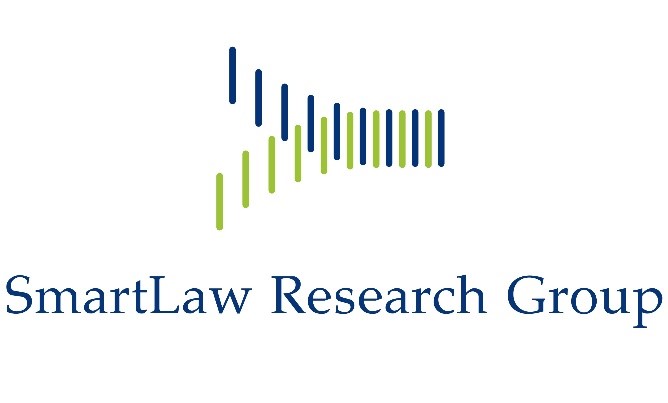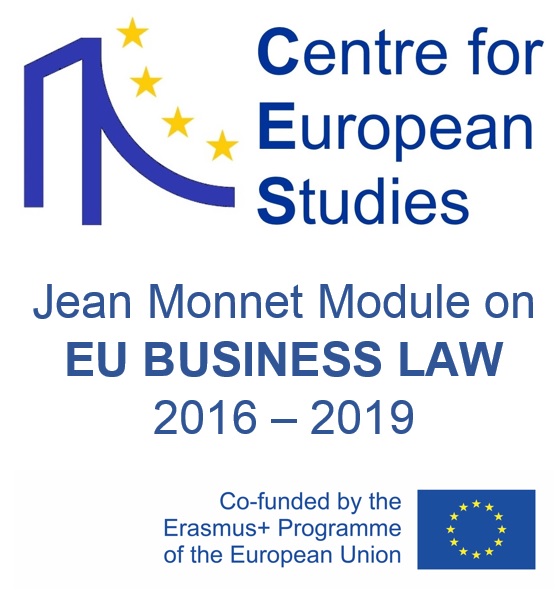Call for papers
Download Call for papers

"EU Business Law through the lens of Digital Revolution"
2nd EU Business Law Forum
Call for papers
14th June 2019
The conference is carried out within the research stream of “Jean Monnet Module on EU Business Law” (EUBLAW) funded by the Erasmus+ Programme
Call for papers
The Centre for European Studies (CES) of Faculty of Law and Political Sciences of the Széchenyi István University in cooperation with the SmartLaw Research group is proud to present a call for papers for the event "EU Business Law through the lens of Digital Revolution - 2nd EU Business Law Forum". The Forum is a part of the ‘Jean Monnet Module on EU Business Law’ (EUBLAW) project funded by the European Commission’s Erasmus+ Programme in the Period of 2016 – 2019. The main aim of the conference is to discover the effects of IT-based technological revolution on the business environment in the European Union, particularly on the EU business law regulation.
Concept and main topics
The main purpose of the conference is to identify the recent challenges the EU business sector is facing as a result of the digitalization taken place in both public and private sectors. The conference is referring to Industry 4.0, meaning in essence the technical integration of cyber physical systems into production and logistics and the use of the ’internet of things’ and services in (industrial) processes – including the consequences for a new creation of value, business models as well. An open question of the event is whether we can experience a “Law 4.0” phenomena in the regulation.
The Organising Committee of the conference welcomes paper proposals from varieties of disciplines including not only law, but also economics, international relations and political sciences, and research fields of information technology as well.
The focus areas of the Conference include but are not limited to the following main themes:
1. How law should treat artificial intelligence (AI)?
In 1969 John McCarthy and Patrick J. Hayes from Stanford University stated that “a computer program capable of acting intelligently in the world must have a general representation of the world in terms of which its inputs are interpreted. Designing such a program requires commitments about what knowledge is and how it is obtained.” How can we describe the world around us in legal terms to help the machines decide right from wrong? How do we teach AI fundamental rights (and should we)?
2. Security and privacy issues arising from the digitalization
When it comes to data security, most people think of hacking or viruses. But lawyers have additional concerns. Are spreadsheets being traded? What should appear in billing while maintaining client confidentiality? How do you collaborate without leaving yourself open to a data breach? What data are to be secured while online trading? How does Facebook get the intellectual property rights of the uploaded photos of users? How to protect the privacy of our clients/children? As in the European Union a new regulation on data protection (GDPR) has been adopted, these questions are current
3. Digitalization of the State
In the EU the Digital Single Market Strategy announced by the Commission is built on three pillars: (1) Access: better access for consumers and businesses to digital goods and services across Europe; (2) Environment: creating the right conditions and a level playing field for digital networks and innovative services to flourish; (3) Economy & Society: maximizing the growth potential of the digital economy. Every single Member State has to make efforts towards a better digital market, which also contains digitalized state services, and better (digital) access to the central and local governments.
4. Cryptocurrencies – salvation or products of the devil?
Bitcoin can be seen as an avatar of the modern financial problems: private investors are seeking for assets that are invisible for the state, secure and available without a third party’s necessary interaction or intermediation. At the same time regulators are trying to define what the new product is, and what consequences and social effects does it have. Regulatory chaos parallel with worldwide usage is never a good mixture from the legal aspect. What should we do, how should the state and the end-user deal with cryptocurrencies?
5. Blockchain and smart contracts for the business of the future
Based on the global success of the Bitcoin and other cryptocurrencies businesses in the EU found out that the blockchain technology can be used - among many other innovative ways - as a new type of asset transfer. Even lawyers have to deal with the so called “smart contracts” proclaimed to bring the end of a traditional profession. How can we utilize this technology in service of the next generation of the EU? Are smart contract the beginning or the end (or the beginning of the end) of attorney’s present life?
Submission guidelines
The Organising Committee invites both junior and senior scholars – including PhD students – to participate to the call for papers of the conference. Paper proposals should be prepared for anonymous review, must not exceed 300 words and should be submitted in DOC or PDF document to the Organising Committee at ces@sze.hu, please add “EU Business Law conference 2019” to the subject. The deadline of submission is 26th April 2019. In addition to the abstract, a separate document should be enclosed with information on the name, affiliation, contact details of the author. Applicants may use the enclosed template, or any other form with the same content. Proposals will be selected on the basis of the submitted abstracts and successful applicants will be informed not later than 3rd May 2019. The draft papers (or ppt presentations) should be sent to the Organising Committee until 10th June 2019. No conference fee is applied. Publication of the papers will take form as Working Papers in the electronic journal of the Centre of European Studies ‘EU Business Law Working Papers’. Moreover, selected papers will be published in an edited and thematic volume in both hard copy and e-book format in the second half of 2019.
Timeline
- 26th April 2019 – The deadline for the submission of abstracts
- 3rd May 2019 – Notifications sent on the accepted papers
- 10th June 2019 – The deadline for sending the ppt presentations
- 14th June 2019 – “EU Business Law through the lens of Digital Revolution” Conference
- 30th July 2019 – The deadline for the submission of the draft papers
- 31st August 2019 – Submission of the final versions of the papers for publication
Organising Committee
The Organising Committee is composed of the members of the Centre for European Studies and researchers of the SmartLaw Research Group:
- László Milassin JD, PhD (head of the Centre, former Jean Monnet Chair holder, CES)
- Judit Glavanits JD, PhD (head of department, associate professor, CES and SmartLaw Research Group )
- Balázs Horváthy JD, PhD (associate professor, CES)
- László Knapp JD (EU law lecturer, CES)
- Péter Bálint Király JD (PhD student, SmartLaw Research Group)
Venue
 The Conference will be hosted by the Faculty of Law and Political Sciences of Széchenyi István University. The Széchenyi István University is a leading higher educational centre in the North Transdanubian region in Győr, in the middle of a ‘triangle’ between Budapest, Vienna and Bratislava. Benefiting from its advantageous location, Győr has become a significant industrial, trade and business centre of Hungary. The industrial park of Győr gives place to the plant of Audi Hungaria Motor Kft, which operates the largest car engine factory in the world and also hundreds of suppliers in the field of the automotive industry are established in the agglomeration of the town.
The Conference will be hosted by the Faculty of Law and Political Sciences of Széchenyi István University. The Széchenyi István University is a leading higher educational centre in the North Transdanubian region in Győr, in the middle of a ‘triangle’ between Budapest, Vienna and Bratislava. Benefiting from its advantageous location, Győr has become a significant industrial, trade and business centre of Hungary. The industrial park of Győr gives place to the plant of Audi Hungaria Motor Kft, which operates the largest car engine factory in the world and also hundreds of suppliers in the field of the automotive industry are established in the agglomeration of the town.
Contact, information and notes
All questions and inquiries regarding the “EU Business Law through the lens of Digital Revolution” conference should be sent to ces@sze.hu, the Organising Committee makes every effort to respond all questions as soon as possible.
More information on the Faculty and Győr is available at http://dfk.sze.hu/en_GB/home and http://turizmus.gyor.hu/lang/en/, and more info on SmartLaw Researh Group is available at http://www.smartlawresearch.hu.
Please note, that the participation of the conference is free of charge, but every participants must cover his/her own costs on travel and accommodation.
Please note, that the Organizers do not provide translation during the Conference.
Győr, 6th February 2019.
Download Call for papers



